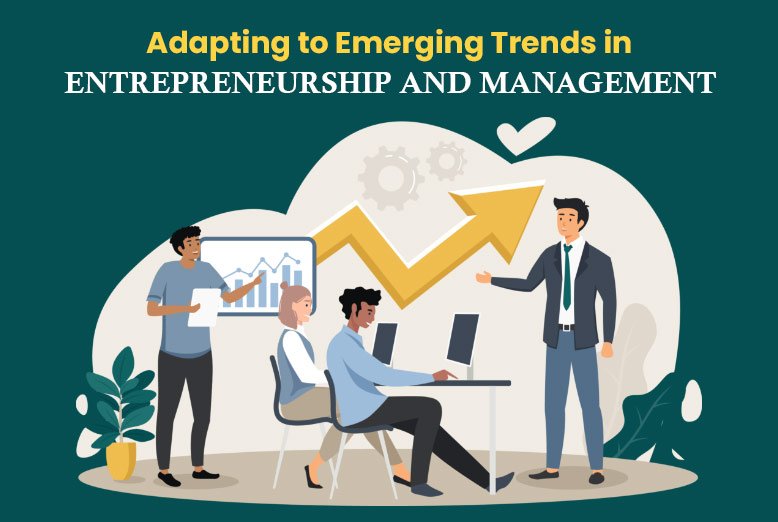In the ever-evolving landscape of entrepreneurship and management, staying ahead of the curve is crucial for sustained success. The dynamic nature of this field demands that entrepreneurs and managers remain vigilant, adaptable, and open to new ideas.
As technology advances at an unprecedented pace, consumer behaviors shift, and global markets become increasingly interconnected, businesses must navigate a complex web of challenges and opportunities. To thrive in this environment, it is essential to stay informed about emerging trends and develop strategies to leverage them effectively.
This article explores key trends shaping the future of entrepreneurship and management, providing insights and guidance for those seeking to stay ahead in a rapidly changing world. By understanding and adapting to these trends, entrepreneurs and managers can position themselves for long-term success and make a positive impact on their organizations and communities.
Technological Advancements
Digital transformation has become a driving force in the business world, revolutionizing operations and decision-making processes. The integration of artificial intelligence (AI) and machine learning has enabled companies to harness the power of predictive analytics, allowing them to make data-driven decisions and optimize their strategies.
By leveraging these technologies, entrepreneurs and managers can gain valuable insights into market trends, customer behavior, and operational efficiency. This not only enhances their ability to make informed decisions but also facilitates innovation and growth.
As technology continues to evolve, staying abreast of the latest advancements and incorporating them into business practices will be essential for maintaining a competitive edge.
Shifts in Consumer Behavior
In the digital age, consumer behavior has undergone a significant transformation. Today’s consumers are increasingly digital-first, expecting seamless and personalized experiences across multiple channels. To meet these expectations, entrepreneurs and managers must adapt their strategies to prioritize customer engagement and satisfaction.
This involves leveraging data analytics to gain a deeper understanding of consumer preferences and tailoring products, services, and marketing efforts accordingly.
By creating personalized and engaging customer experiences, businesses can foster loyalty, drive sales, and build strong brand relationships. Adapting to the evolving needs and expectations of consumers is crucial for long-term success in the modern marketplace.
Sustainability and Social Responsibility
As global awareness of environmental and social issues grows, businesses are increasingly expected to adopt sustainable practices and contribute to positive change. Integrating eco-friendly practices into business models not only demonstrates a commitment to sustainability but also resonates with environmentally conscious consumers.
Additionally, the rise of social entrepreneurship has highlighted the potential for businesses to address global challenges and create social impact.
By aligning their operations with sustainable and socially responsible practices. Entrepreneurs and managers can differentiate themselves in the market, attract like-minded customers and investors, and contribute to a better future for all.
Remote Work and Workplace Flexibility
The COVID-19 pandemic has accelerated the trend towards remote work and flexible working arrangements. As a result, entrepreneurs and managers must adapt their management strategies to effectively lead and support a distributed workforce.
This involves implementing tools and practices that facilitate communication, collaboration, and productivity in a remote setting. By embracing workplace flexibility and leveraging technology, businesses can attract and retain top talent, improve employee satisfaction, and optimize operational efficiency.
Adapting to this new reality requires a shift in mindset and a willingness to experiment with new approaches to management and team dynamics.
Globalization and Market Expansion
As businesses continue to expand their reach beyond national borders, entrepreneurs and managers must navigate the complexities of international operations. This involves understanding and adapting to diverse cultural norms, regulatory environments, and market dynamics.
To succeed in the global marketplace, it is essential to develop cross-cultural competencies and build strong partnerships with local stakeholders. By leveraging the opportunities presented by globalization, businesses can access new markets, tap into diverse talent pools, and drive innovation through cross-border collaboration.
However, this requires a strategic approach and a willingness to invest in the necessary resources and capabilities.
Innovative Business Models and Strategies
The emergence of new business models and strategies has disrupted traditional industries and created new opportunities for entrepreneurs and managers. Subscription services, the gig economy, and platform-based businesses have gained significant traction in recent years, offering innovative ways to deliver value to customers and generate revenue.
Additionally, agile methodologies have become increasingly popular, allowing businesses to rapidly respond to market changes and customer needs. By exploring and adopting these innovative approaches, entrepreneurs and managers can stay ahead of the curve and create sustainable competitive advantages.
Personal Branding and Digital Presence
In today’s digital age, building a strong personal brand is essential for entrepreneurs and managers looking to establish credibility, attract opportunities, and stand out in a crowded marketplace. Leveraging social media and online platforms to showcase expertise, share valuable insights, and engage with audiences can significantly enhance visibility and influence.
By consistently creating and sharing high-quality content, entrepreneurs and managers can position themselves as thought leaders in their respective fields, build trust with their target audience, and open doors to new connections and collaborations. Some collaborations might allow them to attend industry events as a speaker, which could open even greater opportunities. For example, they could get a TEDx Talk. This exposure can enhance their personal brand and help them stand out in a crowded marketplace.
Investing time and effort into developing a compelling digital presence can yield significant benefits for personal and professional growth.
Financial Management and Investment Trends
As the global economy evolves, entrepreneurs and managers must adapt to changing investment landscapes and develop strategies for financial resilience and growth. This involves staying informed about emerging investment trends, such as impact investing, cryptocurrencies, and alternative assets, and assessing their potential risks and benefits.
Additionally, implementing sound financial management practices, such as budgeting, cash flow forecasting, and risk management, is crucial for maintaining financial stability and optimizing resources. By proactively managing finances and making informed investment decisions, entrepreneurs and managers can position their businesses for long-term success and capitalize on new opportunities as they arise.
Continuous Learning and Skill Development
In a rapidly changing business environment, continuous learning and skill development are essential for entrepreneurs and managers to stay competitive and adapt to new challenges. As technologies evolve and market demands shift, it is crucial to upskill and reskill regularly to remain relevant and valuable.
This involves actively seeking out learning opportunities, such as online courses, workshops, and mentorship programs, and dedicating time to acquiring new knowledge and skills.
Additionally, fostering a culture of continuous learning within organizations can help teams stay agile, innovative, and equipped to tackle emerging challenges. By prioritizing lifelong learning and investing in personal and professional development, entrepreneurs and managers can future-proof their careers and drive long-term success.
The Role of an Accountability Coach in Entrepreneurship and Management
In the fast-paced world of entrepreneurship and management, having an accountability coach can be a game-changer. An accountability coach is a professional who helps individuals set goals, develop action plans, and stay on track toward achieving their objectives.
By providing guidance, support, and regular check-ins, an accountability coach can enhance goal achievement and foster personal growth. For entrepreneurs and managers, working with an online accountability coach can be particularly beneficial, as it allows for flexibility and convenience in scheduling sessions and receiving support.
Implementing accountability structures, such as regular progress reviews and goal-setting exercises, can help entrepreneurs and managers stay focused, motivated, and committed to their personal and professional development.
Conclusion
The landscape of entrepreneurship and management is constantly evolving, presenting both challenges and opportunities for those willing to embrace change and innovation. By staying attuned to emerging trends, entrepreneurs and managers can position themselves for success in a dynamic and competitive environment.
Moreover, working with an accountability coach, building a strong personal brand, adapting to financial and investment trends, and prioritizing continuous learning and skill development are key strategies for thriving in the face of change. As we look to the future, it is clear that those who are proactive, adaptable, and open to new ideas will be best positioned to navigate the complexities of the business world and achieve long-term success.
By embracing these trends and strategies, entrepreneurs and managers can not only survive but thrive in the ever-evolving landscape of entrepreneurship and management.
Also Read: 15 Inspirational Quotes about Startups to scale up your entrepreneurship















